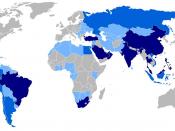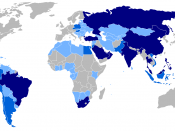There were many discussions regarding the benefits and detrimental consequences of financial liberalizations, however the issue is still subject to continuous debates and no ultimate solution have been reached at. The main issue of the debate is that there are significant positive effects of international capital surges into developing economies, but negative consequences can quickly overshadow these benefits if short-term inflows are allowed to reach unsustainable levels. The potential costs, and possible solutions to such problems, must be weighed against the benefits in order to determine whether short-term capital should be allowed to flow, without restriction, over international boundaries.
Basically capital account transactions are classified into portfolio investment and direct investment. Portfolio investment encompasses trade in securities like stocks, bonds, bank loans, derivatives, and various forms of credit (commercial, financial, guarantees). Direct investment involves the purchase of real estate, production facilities, or substantial equity investment. To answer the question whether financial liberalization is good or bad we need to analyze arguments given by both opponents and proponents of financial liberalization.
First we will consider arguments against financial liberalization followed by arguments supporting the view of financial liberalization.
Arguments against financial liberalization
Research finding proving the detrimental effect of liberalization on the financial system
The Wyplosz research paper says that the evidence based on studies of the experience with liberalization in a sample of 27 developing and developed economies seems to be converging to the view that liberalization contributes to both banking and currency crisis.
A study by Eichengreen, Andrew Rose and Wyplosz (1995) found that the presence of capital controls reduces the possibility of a currency crisis. This result has been confirmed in a 1999 study by Marco Rossi (IMF working paper WP/99/66) for a sample that includes developing countries
Kaminsky and Reinhart's (1999) paper explored the links between banking...


